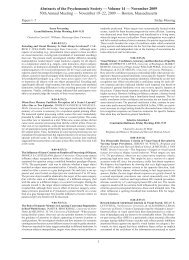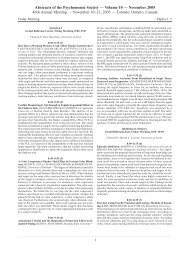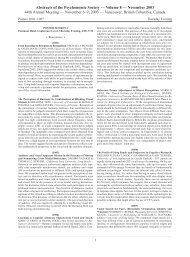S1 (FriAM 1-65) - The Psychonomic Society
S1 (FriAM 1-65) - The Psychonomic Society
S1 (FriAM 1-65) - The Psychonomic Society
Create successful ePaper yourself
Turn your PDF publications into a flip-book with our unique Google optimized e-Paper software.
Sunday Morning Papers 270–276<br />
items in new pairings), inverted-format pairs (studied pairs in which<br />
the picture–word format of each item was switched), half-old pairs (1<br />
studied item, 1 unstudied item), and new pairs (2 unstudied items). Patients,<br />
particularly those with confabulation, committed more false<br />
alarms to inverted-format pairs than did controls. In contrast, false<br />
alarms to rearranged pairs and other lures did not differ between<br />
groups. <strong>The</strong>se findings suggest that AR and SM tap distinct processes,<br />
with only the latter depending on ventromedial prefrontal cortex.<br />
8:40–8:55 (270)<br />
Cognitive Functioning Mediates the Use of Distinctive Processing<br />
in Reducing Memory Illusions. AYANNA K. THOMAS, Tufts University,<br />
& MARK A. MCDANIEL, Washington University—Recent<br />
studies suggest that distinctive processing can reduce errors of commission<br />
(Arndt & Reder, 2003). <strong>The</strong> present study examines the relationship<br />
between two aspects of distinctive processing (item-specific<br />
and relational) in younger adults, high frontal lobe functioning (FLF)<br />
older adults, and low FLF older adults. Variables presumed to affect<br />
both relational and item-specific processing were manipulated. Younger<br />
adults and high FLF older adults showed reductions in errors of commission<br />
when item-specific processing was executed. Furthermore,<br />
item-specific processing did not necessarily lead to impoverished relational<br />
processing; however, low FLF older adults showed reductions in<br />
errors of commission only when relational processing was impoverished.<br />
<strong>The</strong> results suggest that item-specific and relational processing<br />
may be performed in parallel and may not compete for finite resources.<br />
However, cognitive decline did affect the use of item-specific and relational<br />
information. <strong>The</strong>se findings suggest a model that accounts for<br />
distinctive processing as a function of age-related cognitive decline.<br />
9:00–9:15 (271)<br />
Adaptive Memory: Is Survival Processing Special? JAMES S.<br />
NAIRNE & JOSEFA N. S. PANDEIRADA, Purdue University—<br />
Nairne, Thompson, and Pandeirada (2007) recently proposed that our<br />
memory systems might be “tuned” to remember information that is<br />
processed for survival, perhaps as a result of fitness advantages accrued<br />
in our ancestral past. Across several experiments participants<br />
showed superior memory when unrelated words were rated for survival,<br />
at least when compared with several “deep” processing control<br />
conditions. <strong>The</strong> present experiments extend this “survival effect” to<br />
related lists containing survival-relevant categories. Rating words for<br />
survival in a categorized list, compared to rating the same words for<br />
pleasantness, produced the best recall, even though individual-item<br />
processing (e.g., rating for pleasantness) in a related list is thought to<br />
be an optimal procedure for enhancing subsequent recall. We also report<br />
the results of a category-sorting experiment in which items were<br />
sorted into the same four categories, but those categories were labeled<br />
as either survival-relevant or not.<br />
9:20–9:35 (272)<br />
Differential Effects of Emotional Content in Working Memory and<br />
Recognition. SUSANNE M. JAEGGI, MARTIN BUSCHKUEHL, &<br />
WALTER J. PERRIG, University of Bern (sponsored by Rudolf<br />
Groner)—Emotional content enhances memory performance. In general,<br />
there is a positive recall bias and sometimes, there is a slight advantage<br />
for negative material, which is explained by attentional<br />
processes. Only a few studies investigate the impact of emotional content<br />
on both working memory performance and long-term memory<br />
within subjects. We used a working memory task with neutral, happy,<br />
and angry faces as emotional stimuli. In a surprise recognition task 1 h<br />
after task completion, participants had to indicate which faces were<br />
presented in the working memory task before. We found differential<br />
effects of emotional content in the working memory task and recognition:<br />
Whereas in the working memory task, performance was best for<br />
the angry faces, participants had the longest reaction times to the angry<br />
faces in the recognition task, a dissociation which is interpreted by automatic<br />
and attention-related processes in the working memory condition,<br />
and by mood-repair processes in the recognition task.<br />
42<br />
9:40–9:55 (273)<br />
Inhibition of Eye Movements to Memorized Locations. ARTEM V.<br />
BELOPOLSKY & JAN THEEUWES, Vrije Universiteit Amsterdam—<br />
Recent research has shown a direct link between spatial working memory<br />
and activation of the eye movement system. It was argued that<br />
keeping a location in working memory may be nothing else than the<br />
preparation of an eye movement. <strong>The</strong> present study further examined<br />
this question. Participants were asked to maintain a location in memory<br />
and on half of the trials to make a saccade in response to a central<br />
cue. On half of the trials, the location of the saccade target coincided<br />
with a location kept in memory. We found that participants were<br />
slower in making a saccade to a location kept in spatial working memory<br />
relative to other locations. This inhibition was significantly<br />
greater than inhibition of return caused by the mere presentation of<br />
the cue. <strong>The</strong> results suggest strong involvement of oculomotor system<br />
in maintenance of spatial working memory.<br />
Concept Learning<br />
Beacon A, Sunday Morning, 8:00–10:00<br />
Chaired by Carol A. Seger, Colorado State University<br />
8:00–8:15 (274)<br />
Four Lessons From Cognitive Neuroscience for Category Learning.<br />
CAROL A. SEGER, Colorado State University—First, abstraction and<br />
generalization processes in category learning are situational and limited.<br />
Some neural systems can generalize to new stimuli; others cannot.<br />
Second, cognitive processes recruited during a categorization task that<br />
researchers often assume to be inconsequential in actuality affect<br />
learning. For example, small differences in the characteristics of the<br />
feedback signal in category learning tasks have significant effects on<br />
neural recruitment and resulting learning. Third, categorization is<br />
procedural (that is, reliant on motor systems) to a greater degree than<br />
generally appreciated. Neural systems underlying motor processing<br />
are recruited during categorization, and category knowledge is often<br />
specific to a particular associated motor response. Fourth, the same<br />
neural systems are often recruited regardless of whether category<br />
learning is implicit or explicit. <strong>The</strong>refore, the accessibility of learning<br />
to conscious awareness may not be a fundamental distinction that<br />
can be used to differentiate between learning systems.<br />
8:20–8:35 (275)<br />
Mental Models and Boolean Concept Learning. GEOFFREY P.<br />
GOODWIN & PHILIP N. JOHNSON-LAIRD, Princeton University—<br />
A common source of new concepts is a Boolean combination of existing<br />
concepts—for example, pregnant or nursing women, and not on<br />
medication. As this example illustrates, any Boolean concept can be<br />
defined solely from a combination of properties using negation (not),<br />
conjunction (and), and inclusive disjunction (or). A common intuition<br />
underlying theories of the learning of these concepts is that individuals<br />
attempt to simplify the information presented to them; for example,<br />
they seek a parsimonious decision tree or, in a recent account, a<br />
minimal description of the concept. Here, we show that the intuition is<br />
correct, but that what is minimized is neither a decision tree nor a description,<br />
but the mental models of the concept. A single, theoretically<br />
derived parameter—number of mental models—predicts the difficulty<br />
of learning Boolean concepts better than more elaborate previous accounts.<br />
<strong>The</strong> results of a new experiment also corroborate the theory.<br />
8:40–8:55 (276)<br />
Task Switching in Category Learning: Evidence for Stimulus-<br />
Dependent Representation. MICHAEL A. ERICKSON, University<br />
of California, Riverside—ATRIUM, a multiple-system model of category<br />
learning, posits that within a single category-learning task people<br />
can learn to utilize different systems with different representations<br />
to classify different stimuli. This is referred to as stimulus-dependent<br />
representation (SDR). <strong>The</strong> use of SDR implies that people are switching<br />
from task to task as trials demand. Thus, the use of SDR can be





